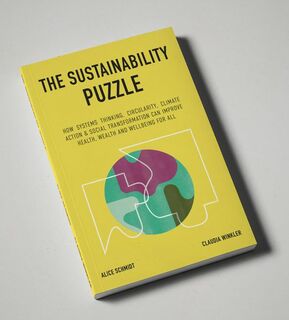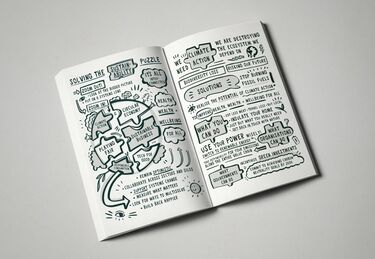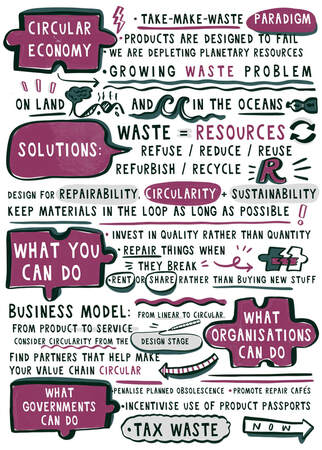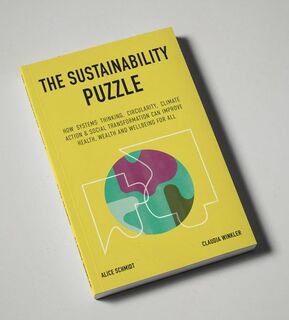Will we solve the sustainability puzzle?
The coronavirus crisis has drawn attention to the complexity and importance of the challenges humanity is facing, but our experience in navigating the crisis has also shown that we can take drastic action. We’ve reached a turning point, and the stakes are high. Will we succeed in halting climate change and biodiversity loss, and in finally securing health, wealth and wellbeing for all?
|
"Brilliant insights, great case studies, real world examples and an integrated thought process pulling so many excellent elements together.”
John F. Kennedy, Flexible Funding & Finance
“A very accessible read with powerful case studies against the backdrop of a global pandemic. A must read.”
Nadine Hatten, International Leader, FMCG industry
The Sustainability Puzzle
|
In this book we explore how looking at the bigger picture and then zooming in on climate action, circularity and social transformation can improve health, wealth and wellbeing for all.
Key insights:
|
About the authors
|
Collaboration is key to making sustainability a reality. As pragmatic thinkers and doers, Alice Schmidt and Claudia Winkler have teamed up to write a book about how we can work together to achieve sustainability. Drawing on their combined 40+ years of experience in addressing issues of social justice, climate action, the circular economy, technology and sustainable business, they show why we should be optimistic about sustainable transformation and offer constructive insights on building back better.
|
Other publications by the authors
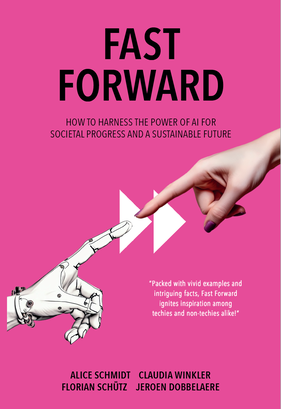
- Schmidt, A. (2024). "Wie eine Zukunft mit KI gelingen kann", in facultas Wissen Spezial 2024. Link
- Dobbelaere, J., Schmidt, A., Schütz, F., Winkler, C. (2023). Fast Forward: How to Harness the Power of AI for Societal Progress and a Sustainable Future.
- Schmidt A. (2021) Health and the City: How Cities Impact on Health, Happiness, and Well-Being. In: Brears R. (eds) The Palgrave Encyclopedia of Urban and Regional Futures. Palgrave Macmillan, Cham. https://doi.org/10.1007/978-3-030-51812-7_170-1
- Borgermann, N., Schmidt, A. and Dobbelaere, J. (2022). Preaching water while drinking wine: Why universities must boost climate action now. One Eartch Commentary I Volume 5, ISSUE 1, P18-21, 22 January 2022; https://www.sciencedirect.com/science/article/pii/S2590332221007338?dgcid=author
- Schmidt, A. and Winkler, C. (2021). Piecing together The Sustainability Puzzle: How an ambitious book was born. One Earth Backstory | Volume 4, ISSUE 10, P1339-1347, October 22, 2021; https://www.cell.com/one-earth/fulltext/S2590-3322(21)00529-7
- Schmidt, A. (2021). "Creating Win-Wins by Taking Drastic Action on Sustainability", online: www.thedefencehorizon.org/post/creating-win-wins-by-taking-drastic-action-on-sustainability
- Winkler, C. (2021). "Wie Non- Profits und Impact Startups zusammen die Gesellschaft verändern können", online: www.techandnature.com/wie-non-profits-und-impact-startups-zusammen-die-gesellschaft-verandern-konnen/
- Schmidt, A. (2020). "50 Opportunities for a Better World". B4 Magazine, issue 62, June 2020, pp. 52 - 55, online: https://issuu.com/b4-business/docs/b462-as-consulting; PDF
- Reschke, J., Winkler C. (2020). "Trends und Ausblick: Was heute und morgen das digitale Fundraising verändert" in Online-Fundraising, Springer Fachmedien Wiesbaden
- Winkler, C. (2020). "5 Gründe warum Unternehmen jetzt auf Nachhaltigkeit setzen sollten", online: www.techandnature.com/5-grunde-warum-unternehmen-jetzt-auf-nachhaltigkeit-setzen-sollten/
- Winkler, C. (2020). "Doughnut Economics- a gamechanging concept on how to create regenerative economies by design" online: theglobal.school/doughnut-economics/
- Winkler, C. (2020). "5 Start-Up Methoden für mehr Nachhaltigkeit", online: www.techandnature.com/startup-methoden-nachhaltigkeit/
- Gradl, C., Schmidt, A. et al. (2019) "Inclusive Business: Make or Buy? Corporate Impact Venturing at the Base of the Pyramid", Endeva. PDF
- Schmidt, A. et al. (2019). "The Use of ICT Solutions in Inclusive Value Chains", Endeva/Fundes. PDF
- UNIDO (2015). “Guide on Gender Mainstreaming of Business, Investment and Technology Services for Private Sector Development”. PDF
- Schmidt, A. (2013). “Glück und Politik: Wie uns die Politik (nicht) glücklich machen kann - Das BIP und seine Alternativen zur Messung von gesellschaftlichem Wohlbefinden und Fortschritt”; Happiness Observer 4-6/2013.
- Schmidt, A. (2013). “Good Practice Guidelines: Partnering for Effective Mining Health Programming”. Mining Health Initiative. PDF
- Schmidt, A. (2013). “Mining Health Programs in Papua New Guinea: Lessons Learned to Inform Good Practice”. Mining Health Initiative. PDF
- Schmidt, A. and Woods, N. (2013). “Newmont Ghana’s Akyem Mine: Lessons Learned in Partnership and Process; Mining Health Initiative Case Study”. PDF
- Schmidt, A. and Timmermans, N. (2013). “Rio Tinto (QMM) and its health programme in Madagascar: Lessons Learned in Partnership and Process; Mining Health Initiative Case Study”. PDF
- Schmidt, A. (2013). “Education: Harnessing School-Based Programmes to Improve Health Outcomes”. Oxford Policy Management/Partnership for Maternal, Neonatal and Child Health. PDF
- Schmidt, A. and Mecaskey, J. “Mining Health Partnerships: A short analytic framework”; Mining Health Initiative. PDF
- Schmidt, A. and Mecaskey, J. (2012). “An analysis of what is known about Mining Industry Health Programmes”; Key literature findings update, Mining Health Initiative. PDF
- Schmidt, A. (2011). “Progress and status quo of democratic ownership: aid effectiveness in El Salvador, Nepal and Mozambique”; Action for Global Health. PDF
- McPake, B., Brikci, N., Cometto, G., Schmidt, A. and Araujo, E. (2011). “Removing user fees: learning from international experience to support the process”; Health Policy and Planning. PDF
- Brown, R. and Schmidt, A. (2011). “Global Guide to CMAM (Community Management of Acute Malnutrition) Integration”; Action Contre la Faim/Action Against Hunger International (forthcoming)
- Schmidt, A. (2010). “Corporate Social Responsibility in Austria”; Chapter in the ‘World Guide to Corporate Social Responsibility’, edited by W. Visser and N. Tolhurst (2010). View
- Schmidt, A. (2009). “The Underfunding of TB Research Across Europe”; Médecins Sans Frontières. PDF
- Schmidt, A. (2009). “Aid Effectiveness in Nepal”; Action for Global Health. PDF
- McPake, B., Schmidt, A., Araujo, E. (2008). “Freeing Up Healthcare – a guide to removing health user fees”; Save the Children UK. PDF
- Berkhout, E. et al. (2008). “Health insurance in low-income countries – where is the evidence that it works?”; Joint NGO lobby paper. PDF
- Schmidt, A. (2008). “Helping Children Survive – Supporting poor families to overcome barriers to maternal, newborn and child health services”; Save the Children UK. PDF
- Schmidt, A. (2007). “Volunteer Child Soldiers as Reality: A Development Issue for Africa”; New School Economic Review, Vol 2(1), 2007, 49-76. PDF
- Schmidt, A. (2006). “Explaining Voluntary Recruitment of Children as Soldiers in Sub-Saharan Africa: Navigating between Victimisation and Agency of Children to Facilitate Reintegration and Peace”; Master’s thesis: School of Oriental and African Studies, University of London.
- Martin, G. et al (2005). “The Impact of HIV/AIDS on Household Vulnerability and Poverty in Vietnam”; UNDP/Ministry of Health. PDF
- Schmidt, A. (2004). Training Module on Stakeholder Analysis; Advocacy Package: Asian Institute for Development Communication/UNFPA.
- Schmidt, A., de Lind van Wijngaarden, J., Bjarnegard, E. (2003). “HIV/AIDS and Education – A Toolkit for Ministries of Education”; UNESCO Bangkok. PDF
- Schmidt, A. (2001). “Brand Preferences and Brand Knowledge of 3 to 5 year old Children in Australia: An Empirical Survey and Ethical issues in Marketing to Children”; Master’s thesis: Vienna University of Economics and Business.
- Deecke, U., Schmidt, A., Windbichler, J. (2000). “Webcheck 2000 - die bedeutung des internets for österreichs top 500 unternehmen“; diamond:dogs
Short articles & commentary
- Happiness as a key business factor: Creating competitive advantage by addressing happiness and assessing social impact; guest commentary.
- 5 Gründe warum Unternehmen jetzt auf Nachhaltigkeit setzen sollten (in German)
- Glück als Wirtschaftsfaktor / Happiness as a key factor for business (in German).
- Doughnut Economics- a gamechanging concept on how to create regenerative economies by design
- 5 Start-Up Methoden für mehr Nachhaltigkeit (in German)
- Wie Non-Profits und Impact Startups zusammen die Gesellschaft verändern können (in German)
- Interview on defining and researching happiness (in German)
- Article on Politics & Happiness in the Happiness Observer (in German). Read summary here.
- Pressetext.at on 15 June 2012 "CSR in Betrieben: Investoren fordern Nachweis - Social Impact Assessment hilft bei Vergleich von Nachhaltigkeit" (‘Corporate Social Responsibility: Investors Demand Proof - Social Impact Assessment to Facilitate Sustainability Comparisons’)
